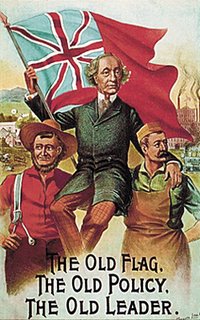So I was saddened, but not entirely surprised to see a column by Coyne making the most explicit version of the neoconservative reduction I have yet seen (not on the Internet, although you can get the first paragraph here). Opposition to Bush is anti-Americanism. Opposition to Israel's wars is anti-Semitism. You know the drill.
The topic of anti-Semitism and criticism of Israel has been done to death in the blogosphere. I'm not really up for it on a fine August day. The question of anti-Americanism is also a delicate one, but not quite so much, and it lets me quote Graham Greene. The voice of Greene's jaded English war correspondent expresses the combination of irritation, affection and unease so many of us who share the English language and Protestant-style civilization feel about our Yankee cousins.
"Have you any hunch," the economic attaché asked, "why they killed him? and who?"
Suddenly, I was angry; I was tired of the whole pack of them with their private stores of Coca Cola and their portable hospitals and their too wide cars and their not quite latest guns. I said, "Yes. They killed him because he was too innocent to live. He was young and ignorant and silly and he got involved. He had no more of a notion than any of you what the whole affair's about, and you gave him money andBernard Lewis'sYork Harding's books on theMiddleEast and said, 'Go ahead. Win theMiddleEast for democracy.' He never saw anything he hadn't heard in a lecture-hall, and his writers and lecturers made a fool of him. When he saw a dead body he couldn't even see the wounds.An IslamofascistA Red menace, a soldier of democracy."
"I thought you were his friend," he said in a tone of reproach.
"I was his friend. I'd have liked to see him reading the Sunday supplements at home and following the baseball. I'd have liked to see him safe with a standardized American girl who subscribed to the Book Club."
It's not at all clear that Greene's narrator really was the young American's friend: they are rivals for the love of a beautiful Vietnamese opium addict. But it is clear that he would have done well to take the Brit's advice. So too George W. Bush should have listened to Messrs. Chréien and Chirac. They didn't know what he was getting into either, but they had a bad feeling about it.
It is quite true that there is a strain of envy running through all anti-Americanism, and Canadian anti-Americanism most of all. And a strain of ingratitude. And the Pithlord has nothing good to say about the type of leftism Social Science and Humanities faculties generate at the rate the tar sands generates greenhouse gas emissions. But, as in ordinary life, we can often see rather clearly the character flaws of those we resent. The most robust finding of real social science is that stereotypes are true to the first approximation. Including the stereotypes of Americans -- of loud, bad listeners, of people more than usually inclined to identify their own interests with the commands of the universe itself.
We all have our faults, and I feel bad rasing those of our neighbours, since few other people are so optimistic, and few other Westerners are so willing to take necessary risks. There are forms of cant that the whole rest of the OECD is far more steeped in than the USA. But no other Western country is able to pretend that its own will is all that matters, that the only real question is how generous it feels.
Whatever our resentments, it certainly is not in my country's interests to have some other hegemon. What we want is not to depose America as monarch of the world, but to impose a constitutional settlement on her.



